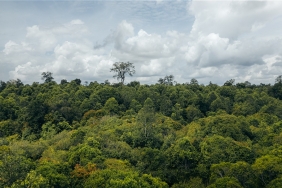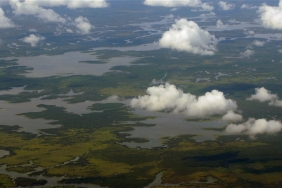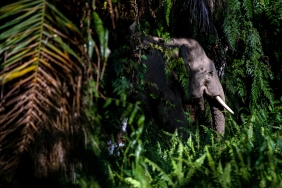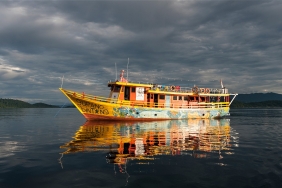CONSERVATION DISCUSSION: IN A HEALTHY ENVIRONMENT, THERE IS A STRONG SOUL
During the Covid-19 pandemic, everyone is trying to maintain their health from within to avoid transmission of the Coronavirus. However, some people may forget that the surrounding environment also affects human health and life. A clean and healthy environment means far from conditions that cause disease. A clean environment will support the realization of a healthy life.
Departing from this understanding, WWF-Indonesia held a Conservation Discussion (DisKo) themed "In a Healthy Environment, There is a Strong Soul" online. The purpose of this DisKo is so that supporters and the general public can understand the importance of fulfilling nutrition to increase immunity, as well as maintaining the environment to remain sustainable. The speakers who shared information included Mia Kartina Fitri as Deputy Director Partnership WWF-Indonesia & Certified Health Coach, Margareth Meutia as Public Campaign Specialist, and Saepul Hamdi Communication & Branding Manager Greeneration Foundation.
"Stay healthy with proper nutrition," were the opening words that started the discussion from Mia Kartina. That sentence is the big title that Mia will elaborate on in this DisKo session. Then, she continued with a series of questions to explore the health problems that might be felt by the DisKo participants. "Have you been feeling tired lately? Easily angry, sad, and depressed? Problems with digestion, even difficulty sleeping? That is one of the signs that our bodies are not getting the right nutrients," she said.
Since the opening part of the dialog, Mia tries to reveal that the source of disease can start from the stomach. Therefore, one's health is influenced by consumption patterns and the fulfillment of daily nutrition. DisKo participants were then invited to learn about the fulfillment of the body's daily nutrition, starting with the introduction of two kinds of nutrition, namely macro nutrition and micro nutrition. Macro-nutrients consist of carbohydrates, proteins, and fats, while micro-nutrients include vitamins and minerals.
"During the Covid-19 pandemic like this, to increase the body's immunity, I recommend eating foods that have minimal cooking process and avoid instant food," Mia said. Furthermore, she also suggested eating vegetables and fruits that contain fiber and nutrients that the body needs. Not to forget, Mia reminds to consume protein such as fish, poultry and red meat in one week. In addition, it is also necessary to intake additional vitamins such as Omega 3, Vitamin B, Zinc, Calcium, and Magnesium. "To boost immunity, we should keep thinking positively, exercise regularly, and get enough rest," Mia said during her presentation.
After the session with Mia was over, the next speaker was Margareth Meutia who shared information with DisKo participants. Maggie - Margareth's nickname, raised the theme of changes in consumption behavior during the Covid-19 pandemic, as well as the good and bad impacts on the environment.
The presentation of the material began with a description of the conditions before the pandemic, where humans on Earth, which numbered 7.8 billion people, carried out their respective activities such as school, work, shopping, traveling, and others simultaneously. This results in a lot of pollution generated from vehicles. However, with the pandemic, conditions and habits have changed drastically, where all activities have become online. This has led to less pollution and CO2 emissions from automobile use, and increased demand for local products. Meanwhile, the use of electricity, water, paper, tissue, from the public sector decreases, but waste production from households increases. "Learning from the pandemic, we can take simultaneous action and make a good impact significantly. The resulting environmental changes, such as pollution, deforestation, forest fires, destructive fisheries support the virus to spread and mutate," said Maggie.
WWF-Indonesia offers a solution that is in line with Maggie's call to reduce the environmental impact of human activities, namely by #BeliYangBaik. Through this campaign, people are invited to consider their needs wisely, so as to avoid buying goods that are not actually needed or impulsive buying.
The way to apply #BeliYangBaik in daily life can start from #BeliYangLokal. By supporting local products, consumers will get more affordable prices, helping to ensure the welfare of farmers, fishermen, and craftsmen. In addition, consumers can also get used to #BeliYangAlami. By using natural products, the body's immunity increases so that it can avoid various kinds of diseases. Another derivative of the #BeliYangBaik campaign is #BeliYangAwet, which means using equipment such as electronic devices, shoes, and clothes that are of good quality, so that their lifespan is longer.
The practice of #BuyWhat'sGood can also be done by #BuyWhat'sEkolabeled, by choosing certain products, the community can encourage producers to be able to produce from nature more environmentally friendly. Lastly, wise consumers must also think about the waste from consumption #WhereWithWhere. People can minimize household waste by bringing their own shopping bags, prioritizing cooking food at home rather than ordering food from outside. DisKo participants were also reminded to recycle packaging so that it can be reused at home.
The Conservation Discussion this time also invited the Greeneration Foundation. This non-governmental environmental organization works with local governments to encourage and change people's habits in waste management in Indonesia. Saepul Hamdi, as Communication & Branding Manager of Greeneration Foundation, shared information in this DisKo opportunity. In the discussion, Saepul invited participants to be more responsible as individuals in society, by considering everything in fulfilling needs, buying what is needed not what is wanted.
"Don't just think about it, but plan what to use, afterward, then start taking action to be able to protect the environment even if you stay at home," said Saepul. Furthermore, Saepul invites the public to start sorting waste so that cleaners do not get infectious diseases. You can do this by marking or writing on garbage that has the potential to become a medium for spreading infectious diseases. Then, use cloth masks to reduce the amount of medical waste generated. He also reminded people not to consume excessive products. "So that everyone can still enjoy the products they need," he said.
Based on data compiled by the Greeneration Foundation, during PSBB (large-scale social restrictions) and appeals to do activities outside the home, waste in public and commercial locations decreased. However, it is inversely proportional to the increase in the volume of waste in households. Based on the data, waste generation has decreased in some cities during the pandemic. For example, waste in Jakarta is only 620 tons/day, while waste in Bogor is 100 tons/day, waste in Denpasar is around 300 tons/day, and waste in Serang is 3 tons/day. Meanwhile, waste in Bandung decreased by 40 percent.
At the end of the event, the moderator concluded that this pandemic seems to disconnect humans from nature, by isolating themselves. On the one hand, the state of nature is improving in the midst of a pandemic. Supposedly, this condition is created because humans protect it, not a virus that forces it. Because, humans really need nature and a healthy environment. By protecting the environment, global citizens can ensure human survival for generations to come.





